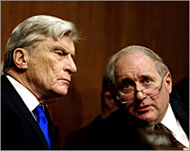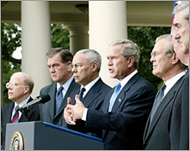Rumsfeld against swift reforms
US Secretary of Defence Donald Rumsfeld and acting CIA Director John McLaughlin have said imposing dramatic reforms on the intelligence community too quickly could do more harm than good.

Rumsfeld expressed tepid support for the 9/11 commission’s call for a rapid overhaul of the system and the creation of a national director of intelligence.
But he recently warned members of the Senate Armed Services Committee that the US should not force premature changes to the intelligence services during a time of war.
“National security is not easily achieved in this new century,” Rumsfeld said. “If we move too unwisely and get it wrong, the penalty will be great.”
Many of the recommendations made by the 9/11 commission could have significant implications for the Pentagon, which receives 85% of the estimated $40 billion intelligence budget.
National director
|
“National security is not easily achieved in this new century. If we move too unwisely and get it wrong, the penalty will be great” Rumsfeld |
The commission favours creating a national intelligence director with budget and personnel authority over the government’s 15 intelligence agencies.
Rumsfeld endorsed the idea in principle, but declined to say how much power such a position should have over the existing network.
However, consolidating intelligence collection agencies such as the National Security Agency and putting them under the leadership of a national director could create “additional problems” between those agencies and the military, he said.
“As an example, we wouldn’t want to place new barriers or filters between the military combatant commanders and those agencies when they perform as combat support agencies,” he said.
Posing obstacles
McLaughlin, made acting director after George Tenet resigned on 11 July in the wake of criticism of the spy agency over pre-September 11 intelligence and faulty information used to justify last year’s invasion of Iraq, echoed many of Rumsfeld’s concerns.
The man who will make way for President George Bush’s nominee Porter Goss if Congress approves his leading of the CIA, said a larger bureaucracy could hinder the ability of the intelligence community to move quickly against suspected threats.
“Speed and agility are the keys to the war on terrorism and profoundly important to the nation’s other intelligence challenges,” McLaughlin said.
Politicising intelligence
 |
|
Levin (R) warns against shaping |
Senator Carl Levin, a Democrat from Michigan, said any reforms must address the problem of “politicising intelligence” to meet the strategic goals of the White House.
“Regardless of the responsibilities we might choose to give the proposed national intelligence director and national counterterrorism centre … we must take steps to avoid the second major intelligence failure: The shaping of intelligence assessments to support administration policies – any administration,” Levin said.
McLaughlin said the intelligence community had instituted meaningful changes in recent months and had overcome many of the security obstacles cited by the 9/11 commission.
“The image that many seek to perpetuate of a community that does not share information or work together, a community of turf-conscious people competing for influence – that is not the community I lead,” he said.
Mixed reactions
Reactions among former intelligence officials to the 9/11 commission proposals has been mixed. James Schlesinger, former Defence Secretary under Presidents Nixon and Ford, recently told senators that creating a new bureaucracy and restructuring authority could intensify turf battles among agencies.
“I don’t think that the authorities in the Department of Defence should be placed under the [national intelligence director],” he said.
 |
|
Bush (C) supports the idea of a |
At a hearing conducted by the Senate Governmental Affairs Committee, three former CIA directors all said a new intelligence tsar would be counter productive unless given legitimate power over personnel and budgetary issues.
“The worst thing that can come of this is we create an NID and not give him authority,” said Stansfield Turner, who ran the CIA from 1977-81.
White House opposition?
Bush has said he will support the idea of a national intelligence director with limited powers.
But Republican Senator Pat Roberts of Kansas, chairman of the Senate Select Committee on Intelligence, has drafted legislation that would give such an intelligence chief much of the authority the administration opposes.
White House Press Secretary Scott McClellan recently denied the president opposed giving budget authority to the national director and said all options were still under review.
“It’s important for the national intelligence director to have the authority he or she needs to do the job,” McClellan said.